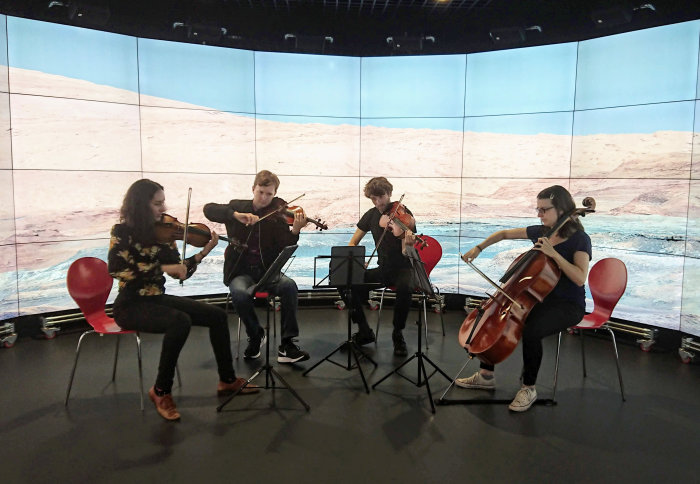Music and science collide as Holst’s The Planets gets a modern makeover

The Ligeti Quartet practises at Imperial's Data Observatory in front of a Curiosity photo of Mars
A new Planets suite has launched at the Royal Observatory – with a little help from Imperial space scientists.
Gustav Holst’s The Planets rocked the classical world a century ago. Shaped by an astrological understanding of our solar system, the seven-piece composition became a mainstream classic - but thanks to modern planetary science, we now know more than ever about the planets’ true characters.
Now, two space explorers from Imperial College London have helped to mark The Planets’ centenary by mentoring the composers of the new Earth, Mars, and Venus pieces.
Led by production company Sound UK, the London-based Ligeti Quartet performed the music at six UK locations. Listen to the live concert recording here.
Scientific shakeup
Holst’s view of Mars, the Bringer of War, was fiery and tempestuous, while Venus, the Bringer of Peace, was serene and peaceful. We now know that Mars is the quieter, almost earth-like planet, whereas Venus has a thick atmosphere with sulphuric acid rain and enough heat to melt lead. Dr Philippa Mason Department of Earth Science and Engineering
Helping to revamp Holst’s hundred-year-old masterpieces were Professor Sanjeev Gupta, who mentored the composers of Earth and Mars, and Dr Philippa Mason, who mentored the composer of Venus. Both researchers are earth and planetary scientists from Imperial’s Department of Earth Science & Engineering.
Dr Mason is a remote sensing geologist who uses satellite imagery to study Earth and other planets. She is currently on the science team the EnVision mission, a European Space Agency and NASA quest to send an orbiting spacecraft to Venus - due to launch in 2029.
She mentored Shiva Feshareki in writing Venus. Dr Mason said: “The composers asked what Holst’s pieces would sound like in the hands of modern composers, with today’s knowledge of the solar system. Shiva also revealed that she was inspired by how difficult it was to get to and see the surface of Venus, because of its hot, dense, cloudy atmosphere.
“Holst’s view of Mars, the Bringer of War, was fiery and tempestuous, while Venus, the Bringer of Peace, was serene and peaceful. We now know that Mars is the quieter, almost earth-like planet, whereas Venus has a thick atmosphere with sulphuric acid rain and enough heat to melt lead.”

Professor Gupta is a planetary and earth scientist who studies clues in rocks to uncover planets’ geological histories. He plays a large role in NASA’s Curiosity Rover’s exploration of Mars, and teases out the geological stories written in the red planet’s rocky landscape.
The new Mars piece maintains a sense of depth and power, but includes the calm and stillness too. Deborah Pritchard Composer for Mars
He mentored Ayanna Witter-Johnson, composer for Earth - a new addition to the Suite, as Holst didn’t write a piece for the blue planet. He also worked with Deborah Pritchard, composer for Mars.
Professor Gupta said: “Deborah was really surprised from what she saw of the landscape of Mars, especially in how Earth-like it is. You’d be forgiven for mistaking the Martian landscape as one of Earth’s deserts."
Pritchard said: “It was interesting to realise that Mars isn’t this raging turmoil of storms and winds, but in fact is quite earth-like – almost calm. I was inspired by Mars’ science rather than its astrology, so the new Mars piece maintains a sense of depth and power, but includes the calm and stillness too.”

Professor Gupta added: “Venus a hellish place; a far cry from what Holst had imagined. It’s much more like how he had imagined Mars, and Mars is much more like how he had imagined Venus."
Performing The Planets 2018
The Planets 2018 pieces span contemporary classical, electronica and jazz, to create new works that reflect developments in astronomy and music.
Specifically designed to be performed in planetariums, the first performance was on Saturday 29 September, 2018 in the Royal Observatory, Greenwich, with a foreword from Professor Gupta. Dr Mason will speak at the performance at We the Curious Planetarium, Bristol on Monday 1 October, 2018.
Listen to the full interview with Professor Gupta, Dr Mason, and Deborah here:
Cosmic commitment
As part of its ongoing commitment to the wonders of our universe, Imperial is now taking applications for its new BSc in Earth and Planetary Science.
The new course, launching in Autumn 2019, will focus on geological and geophysical processes in the Solar System, with particular emphasis on the planets, moons and smaller bodies, such as asteroids and comets.
Image credits:
Main image: Imperial College London/Data Science Institute
Image 2: NASA/Jet Propulsion Lab
Image 3: NASA/Mars Curiosity Rover
Article text (excluding photos or graphics) © Imperial College London.
Photos and graphics subject to third party copyright used with permission or © Imperial College London.
Reporter
Caroline Brogan
Communications Division